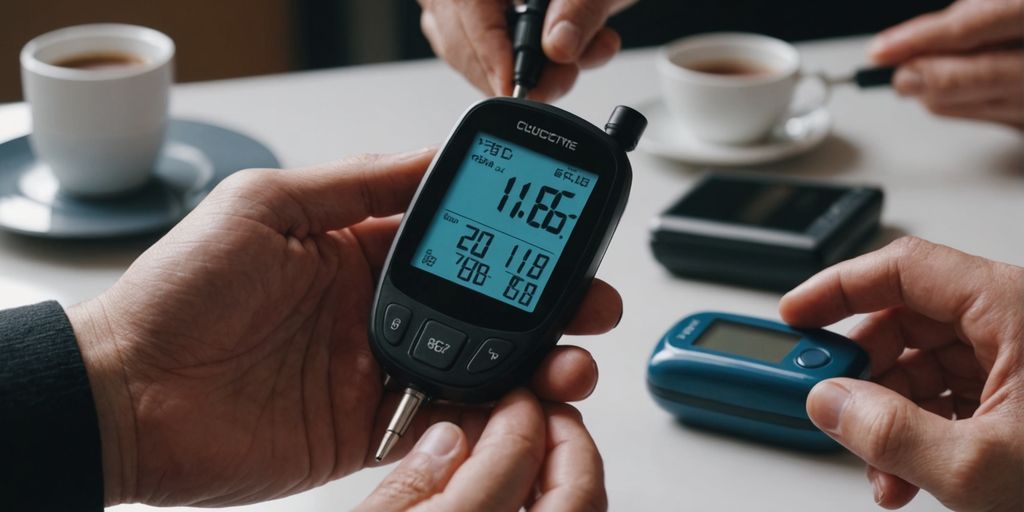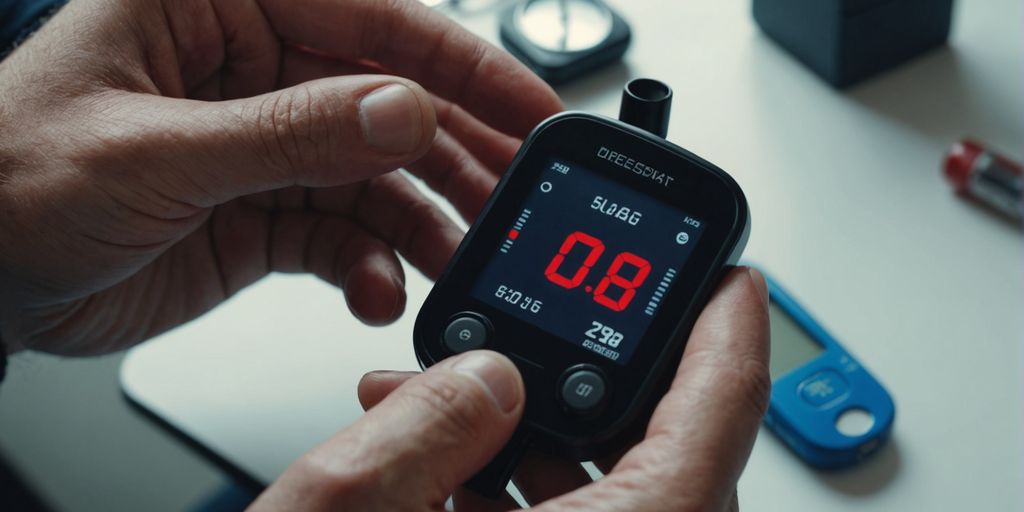Diabetes is a long-lasting condition that affects how the body turns food into energy. Managing diabetes often involves a mix of diet, exercise, and medication. Recently, intermittent fasting has gained attention as a possible way to help control diabetes. This article will explore if intermittent fasting is a safe and effective option for managing diabetes.
Key Takeaways
- Intermittent fasting involves eating during specific time windows and fasting the rest of the time.
- Some studies suggest intermittent fasting may improve insulin sensitivity and help control blood sugar levels.
- Intermittent fasting might not be suitable for everyone, especially those on certain medications or with specific health conditions.
- Always consult a healthcare professional before starting intermittent fasting to ensure it’s safe for your situation.
- More research is needed to fully understand the long-term effects of intermittent fasting on diabetes management.
Understanding Diabetes and Its Management

Types of Diabetes
Diabetes is a chronic condition that affects how the body processes blood sugar. There are several types of diabetes, but the most common ones are Type 1 and Type 2 diabetes. Type 1 diabetes is an autoimmune condition where the body attacks insulin-producing cells. Type 2 diabetes, on the other hand, is often related to lifestyle factors and occurs when the body becomes resistant to insulin or doesn’t produce enough of it. Another condition to be aware of is prediabetes, where blood sugar levels are higher than normal but not high enough to be classified as diabetes.
Common Symptoms
Recognizing the symptoms of diabetes early can help in managing the condition effectively. Common diabetes symptoms include:
- Increased thirst and hunger
- Frequent urination
- Unexplained weight loss
- Fatigue
- Blurred vision
- Slow-healing sores
If you notice any of these symptoms, it’s important to consult a healthcare provider for proper diagnosis and treatment.
Traditional Management Approaches
Managing diabetes typically involves a combination of lifestyle changes and medication. Here are some traditional management approaches:
- Healthy Diet: Eating a balanced diet rich in fruits, vegetables, and whole grains can help manage blood sugar levels. By managing diabetes with a healthy diet and regular exercise, you can better control your blood sugar levels.
- Regular Exercise: Physical activity helps to lower blood sugar levels and improve insulin sensitivity.
- Medication: Depending on the type of diabetes, medication may be required to help manage blood sugar levels. This can include insulin injections or oral medications.
- Monitoring Blood Sugar: Regular monitoring of blood sugar levels is crucial for managing diabetes effectively.
It’s essential to work closely with healthcare professionals to create a personalized diabetes management plan that suits your needs.
What is Intermittent Fasting?
Intermittent fasting is a way of eating where you switch between periods of eating and fasting. This method can help your body burn fat after it has used up the calories from your last meal.
Different Methods of Intermittent Fasting
There are several ways to do intermittent fasting:
- 16/8 Method: You fast for 16 hours and eat during an 8-hour window each day.
- 5:2 Diet: You eat normally for five days a week and limit yourself to 500-600 calories on the other two days.
- Eat-Stop-Eat: You fast for a full 24 hours once or twice a week.
- Alternate-Day Fasting: You alternate between days of normal eating and days of fasting.
Potential Benefits
Intermittent fasting can offer several health benefits. Studies have shown that it can help with weight loss, improve heart health, and even boost brain function. It may also help reduce the risk of chronic diseases like type 2 diabetes and heart disease.
This is the Golden Key for those who want to:
- Achieve their best physique fast
- Get started with healthy living
- Break the weight-loss plateau
- Live a longer & healthier life
- Look good and feel better in their own skin
- Increase their self-esteem & build self-confidence
- Be in a more positive, creative, high-energy & motivated state
Scientific Research on Intermittent Fasting
Research on intermittent fasting is ongoing, but early results are promising. Some studies suggest that intermittent fasting can improve insulin sensitivity and help control blood sugar levels. However, more research is needed to fully understand its long-term effects.
Intermittent fasting is when you alternate between eating and fasting. Some schedules include fasting two days a week or eating only during certain hours.
Intermittent Fasting and Blood Sugar Control

Effects on Insulin Sensitivity
Intermittent fasting can help improve insulin sensitivity. During fasting periods, insulin levels drop, allowing cells to become more receptive to insulin when eating resumes. This increased sensitivity helps regulate blood sugar levels more effectively, reducing the risk of dangerous spikes and crashes that are common in diabetes.
Impact on Blood Glucose Levels
Studies have shown that intermittent fasting can lead to better blood glucose control. By limiting meal intake to specific times, intermittent fasting helps control the release of glucose into the bloodstream. For instance, a study from China suggests that a 5:2 intermittent fasting diet with meal replacement may be helpful for people with type 2 diabetes. This can result in reduced fasting blood sugar levels and improved overall glucose management.
Long-term Effects on Diabetes Management
The long-term effects of intermittent fasting on diabetes management are still being studied. However, some research indicates that it can be a sustainable way to manage blood sugar levels and reduce reliance on medication. It’s important to consult with healthcare professionals to tailor a fasting plan that suits individual needs and conditions.
Intermittent fasting may offer a promising approach to managing diabetes, but it requires careful planning and monitoring to ensure safety and effectiveness.
Safety Considerations for Diabetics

Potential Risks of Intermittent Fasting
Intermittent fasting can pose several risks for diabetics. One major concern is the potential for hypoglycemia, or low blood sugar levels. This can happen if you skip meals or go for long periods without eating. Symptoms of hypoglycemia include dizziness, sweating, and confusion. Another risk is hyperglycemia, or high blood sugar levels, which can occur if your body releases too much glucose in response to fasting. Both conditions can be dangerous and require immediate attention.
Who Should Avoid Intermittent Fasting?
Not everyone with diabetes should try intermittent fasting. People with type 1 diabetes, for example, are at a higher risk of complications like diabetic ketoacidosis. Pregnant women, children, and those with a history of eating disorders should also avoid this diet. It’s crucial to consult your healthcare provider before starting any new eating plan.
Monitoring Health During Fasting
If you decide to try intermittent fasting, regular monitoring of your blood sugar levels is essential. Use a glucose meter to check your levels multiple times a day. Keep a log of your readings and note any symptoms you experience. If you notice any signs of hypoglycemia or hyperglycemia, take action immediately. Always have a plan in place for how to manage low or high blood sugar levels, including having glucose tablets or snacks readily available.
When included in a thorough diabetes care plan, intermittent fasting can be a useful strategy if it is appropriate for you.
Personal Experiences and Case Studies
Success Stories
Many individuals with diabetes have found success with intermittent fasting. For instance, some have reported significant improvements in their blood sugar levels and overall health. A randomized clinical trial has shown that intermittent fasting can be more effective than traditional drugs in managing early type 2 diabetes.
Challenges Faced by Individuals
While there are success stories, some people face challenges when trying intermittent fasting. These can include feelings of hunger, difficulty sticking to the fasting schedule, and managing social situations that involve food. It’s important to recognize these challenges and find ways to address them.
Expert Opinions
Experts have mixed opinions on intermittent fasting for diabetes management. Some believe it offers a promising alternative to traditional methods, while others caution that more research is needed. They emphasize the importance of consulting healthcare professionals before starting any new dietary regimen.
Integrating Intermittent Fasting into a Diabetes Management Plan

Consulting Healthcare Professionals
Before starting intermittent fasting, it’s crucial to consult your healthcare team. They can help you decide if this approach is safe for you. Your doctor can also guide you on how to adjust your medications and monitor your blood sugar levels during fasting periods.
Creating a Balanced Diet
A balanced diet is essential when practicing intermittent fasting. Focus on nutrient-dense foods that provide essential vitamins and minerals. This helps maintain your energy levels and supports overall health. Consider including a variety of fruits, vegetables, lean proteins, and whole grains in your meals.
Adjusting Medication
If you are on diabetes medication, you may need to adjust your dosage. Fasting can affect how your body responds to medication, so it’s important to work closely with your healthcare provider. They can help you make necessary changes to avoid any potential risks.
Intermittent fasting can be a useful tool when used in a comprehensive diabetes management plan. However, it is not a one-size-fits-all method and should be tailored to individual needs.
By following these steps, you can safely integrate intermittent fasting into your diabetes management plan and potentially improve your blood sugar control.
Future Research Directions
Ongoing Studies
Research on intermittent fasting and diabetes is rapidly evolving. A systematic review and meta-analysis identified 116 original studies on this topic, highlighting the growing interest in this area. Current studies are exploring various fasting methods and their effects on blood sugar control, insulin sensitivity, and overall health.
Potential Innovations in Diabetes Management
Future research may uncover new ways to integrate intermittent fasting into diabetes care plans. Innovations could include personalized fasting schedules, advanced monitoring tools, and tailored dietary recommendations. These advancements aim to make fasting a more viable option for a broader range of individuals.
Long-term Impact of Fasting
Understanding the long-term effects of intermittent fasting on diabetes management is crucial. Researchers are focusing on how sustained fasting practices impact blood glucose levels, weight management, and overall health over extended periods. This knowledge will help determine the safety and effectiveness of intermittent fasting as a long-term strategy for diabetes care.
Conclusion
Intermittent fasting shows promise as a tool for managing diabetes, particularly type 2 diabetes. It can help improve blood sugar control, enhance insulin sensitivity, and support weight loss. However, it’s not suitable for everyone. People with diabetes should consult their healthcare team before starting intermittent fasting to ensure it’s safe and effective for their specific needs. While intermittent fasting can be a valuable part of a diabetes management plan, it should be approached with caution and personalized to each individual’s health condition.
Frequently Asked Questions
What is intermittent fasting?
Intermittent fasting is a way of eating where you only eat during certain times of the day or week. For example, you might eat for 8 hours and fast for 16 hours each day.
Can intermittent fasting help manage diabetes?
Yes, intermittent fasting can help manage diabetes by improving blood sugar control and increasing insulin sensitivity. However, it’s important to consult a doctor before starting.
Are there different methods of intermittent fasting?
Yes, there are several methods. Some popular ones include the 16/8 method (fasting for 16 hours and eating for 8 hours), the 5:2 diet (eating normally for 5 days and restricting calories for 2 days), and alternate-day fasting.
What are the potential risks of intermittent fasting for diabetics?
Intermittent fasting can cause low blood sugar levels, which can be dangerous for diabetics. It can also lead to fatigue and poor diet choices if not done properly. Always consult a healthcare professional before starting.
Who should avoid intermittent fasting?
People who are pregnant, breastfeeding, have a history of eating disorders, or are on certain medications should avoid intermittent fasting. Always talk to a healthcare provider to see if it’s safe for you.
How can I safely start intermittent fasting if I have diabetes?
If you have diabetes and want to try intermittent fasting, it’s important to work with your healthcare team. They can help you monitor your blood sugar levels and adjust your medications as needed.




